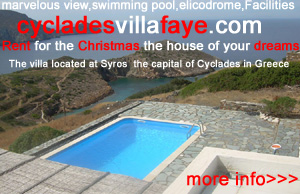STUDENTS PROJECTS
2010

27 January, 2011
“Open-Air Theater on Aigina Island”
The design of the open-air theater is based on Greek mythology.
Student: Petrou Aikaterini
Supervisor: Nikolaos Tsinikas
Date of presentation: 02/07/2010
Aristotle University of Thessaloniki-Faculty of Engineering- Department of Architecture

Brief Summury
Both natural environment of the quarryBesiand respect to this archaeological site, play a catalytic role in the design of the theater and its surrounding area. Taking into account the design requirements, I concentrated on the performance of sensitivity, artistic values and plasticity on the design itself, as I believe an architect should start designing with pencils, colors and paintings.

Text
The quarry Besi in the village Mesagros on Aegina island is an earthen mass that interrupts the green which dominates the area. It is located a few meters below the Temple of Αphaias not far from the village and with a superb view of the port of Pireaus. The quarry operated until 1981, but due to health hazzaerd and other harmful effects the Ministry of Archeology revoked its operation license. Since then it has often been attempted to turn the slope into a debris depot, thereby eradicating its special character.
There are two suggestions for the future of the region: The first, proposed by the Municipality of Aegina, concerns the use of rubble for the complete restoration of the slope, and the second proposes the quarry become a future multi-cultural region. It supports the creation of an open-air theater based on the corresponding examples of the theaters Petra in Petroupoli and Vraxon in Byrona in Athens.

The design of the open-air theater is based on Greek mythology. According to legend Aphaia, daughter of Zeus and Carme, was born in Crete and fell into the sea in order to escape the amorous intentions of Minoa. After many adventures she came to Aegina and she hid in a cave (Cave Aphaia). Pre-Hellenic figures of the goddess Eugonia have been found in the cave. Later this goddess was identified with the goddess Athena and thus we have Aphaia of Athens.
The design of the theater is based on a combination of the "routes" and "stops" of Aphaia. The routes are characterized by the chase of Aphaia and the stops by her various hideouts. This is an adventurous project, with 2 routes to and from the theater and 4 stops: the bar-restaurant, souvenir shops, an exhibition hall and a terrestrial cable car in order for the quarry to attract people even on days that the theater is closed.

Specific actions
The open air-theater respects the topography and is designed in such way so as not to harm the slope. It consists of "buttoned" stands on columns made of concrete, while others are "planted" in the natural embraces of the slope.
The slope is restored with a network of green in order to cover the discontinuity observed even by the ships approaching the island of Aegina.

A large quantity of rubble is used in a creative way for the construction of the project.
Location: Outside the village Mesagros on Aegina Island, Greece
Site Size: 10.305,10 m2
Goals: To restore the slope to its previous natural environment. To attract people by new cultural functions.
Related articles:
- “Τholos & Τheatron” ( 22 March, 2010 )
- Department of Theater Studies in University of Athens Campus ( 01 April, 2008 )
- New theatre complex of Piraeus ( 08 February, 2011 )
- 77 Theatre ( 07 July, 2015 )
- Floating Theatre ( 13 March, 2015 )










